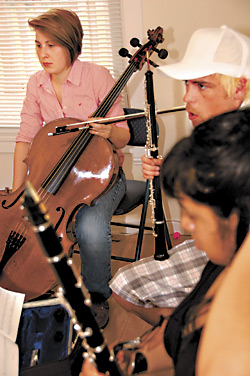In a sunny Ballard living room, Harlan Glotzer is leading the first read-through of his Three Dances for Silent Feet, humming along now and then to fill in for a missing violin. The usual young-composer problems arise: errors in the parts, questions about notation. Passages that may have sounded great on the piano, or via MIDI playback, are something else when set before a real violinist—like a you-must-be-kidding lick in thirds way above the staff. But Glotzer, eager for feedback, is willing to simplify it.
Another figure prescribes the bounced “ricochet” bowing technique—but using the wood, rather than the hair, of the bow; it’s the sort of thing only a composer who’s never worked with strings would come up with. And yet: “That sounds better than I thought,” says Glotzer. Tall and scruffy, wearing an argyle sweater and knee-high motorcycle boots, Glotzer studied at Cornish and since has embarked on the usual postgrad path of day job + gigging, playing concertina in a group called the Toybox Trio.
His music will be premiered this weekend at a series of three concerts, put on by a new organization that has a most unusual philosophy. “For-Profit Art In a Non-Profit Art Town,” reads the headline on the group’s inaugural press release. “Art can make money without begging, and Art can pay those who labor on her behalf,” says the mission statement.
Which might not arouse skepticism, if the Art in question weren’t…contemporary chamber music. “With the right management, the right business plan, and fiscal organization and responsibility,” profit is possible, insists Kevin Cornelius,co-launching the Pacific Northwest Composers Project with Shawn Meloy. It’s a matter of “finding a fine balance between doing art that really engages people and staying within your means.”
Cornelius, an East Coast transplant, supplemented an early interest in composition with clarinet, vocal, and conducting experience at Boston’s Northeastern University; Meloy, an Auburn native, studied composition and oboe at Pacific Lutheran University. At graduation, they faced the question every musician does: What now? Seeing few opportunities to get their music heard, Meloy says, they asked themselves, “Why don’t we stop waiting for somebody else to do it?” This weekend’s concerts have been a year in the planning—paid for out-of-pocket with the intention that box- office income, recording sales (CDs and downloads), and publishing will finance further projects.
The large contingent of string and wind players required was recruited through friends and through Craigslist. Cornelius and Meloy plan to establish a staff of musicians and invite composers to write for them—the PNCP won’t be “a vanity project,” Cornelius asserts—promising a small upfront commission fee enhanced later by royalties from recording sales.
As a mark of their ambitions, Cornelius and Meloy chose Broadway Performance Hall—though there are cheaper venues, it’s “sandwiched between two universities, so we’re able to target a younger base,” says Cornelius. While they want to be accessible, they’re also staying resolutely focused on classical music, as a note on their Web site (www.corneliusmeloy.com) clearly states: “no hip-hop, jazz, aleatory, popular, or serialism.”
Up next at the Ballard rehearsal is Meloy’s string quintet. True to the PNCP’s listener-friendly manifesto, it opens with a throbbing lament in rich, turn-of-the-last-century harmonies and ends with a slightly macabre waltz: Grieg a la Danny Elfman. There’s only time to spot-check; it’s the end of a long, grueling afternoon, and any more rehearsing would be counterproductive anyway. Cornelius and Meloy are wilting too, as the unforeseen effort of concert production takes its toll. “If I had known…maybe it’s not too late to become an accountant,” Cornelius jokes. But in a moment, the crusading spirit returns: “But that wouldn’t be nearly as fun.”
[N.B.: Sunday’s performance has been cancelled.]







